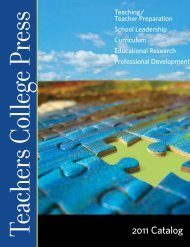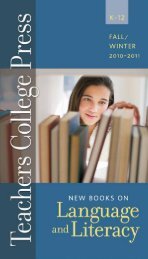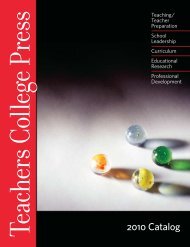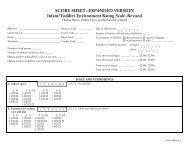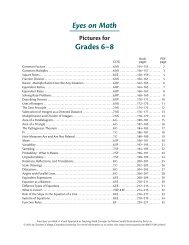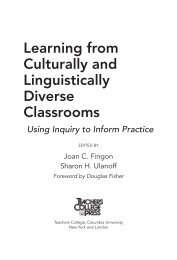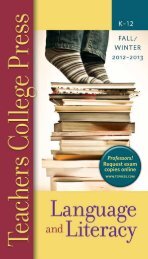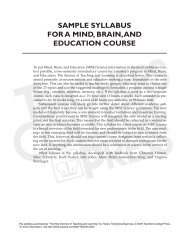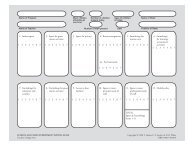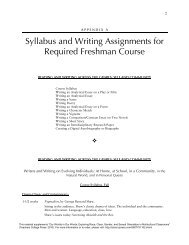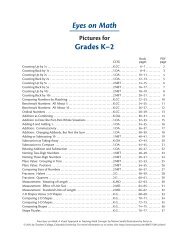Spectacular Things Happen Along the Way - Teachers College Press
Spectacular Things Happen Along the Way - Teachers College Press
Spectacular Things Happen Along the Way - Teachers College Press
You also want an ePaper? Increase the reach of your titles
YUMPU automatically turns print PDFs into web optimized ePapers that Google loves.
made great efforts to place his students’ voices at <strong>the</strong> center of <strong>the</strong> classroom, as opposed<br />
to his own interests, state standards, or a top-down curriculum mandates. The activities<br />
listed here promote a critical awareness of teaching moves that may be observed in a<br />
student-centered curriculum.<br />
Focus Question: How can I allow for an emergent curriculum that reflects <strong>the</strong> interests<br />
and needs of <strong>the</strong> students?<br />
1. List <strong>the</strong> ways that <strong>the</strong> students in Room 405 directed <strong>the</strong>ir social action<br />
project.<br />
2. In dialogic teaching, ideas are drawn from <strong>the</strong> students, ra<strong>the</strong>r than pushed in<br />
by <strong>the</strong> teachers. Through this teaching, students and teachers share in <strong>the</strong><br />
inquiry process and students are often seen talking directly to each o<strong>the</strong>r, not<br />
through <strong>the</strong> teacher. Discuss <strong>the</strong> role of dialogic teaching strategies in<br />
curriculum enactments in general, and social action projects in particular.<br />
Why and when are <strong>the</strong>y important? How can such dialogic encounters<br />
emerge?<br />
3. Write a lesson plan that incorporates a dialogic discussion, such as <strong>the</strong> one<br />
that <strong>the</strong> students had at <strong>the</strong> very start of <strong>the</strong> project (pp. 26–29). How would<br />
you scaffold this experience?<br />
4. Debate <strong>the</strong> implications of Schultz’s interest in following his students’ lead.<br />
For example, he acknowledged that if <strong>the</strong> students had chosen “fruit punch for<br />
lunch” as <strong>the</strong> focus of <strong>the</strong>ir social action project, he would have supported it in<br />
<strong>the</strong> name of student voice (p. 3). What are <strong>the</strong> strengths and limitations of this<br />
approach? Are <strong>the</strong>re certain student concerns that you might not place at <strong>the</strong><br />
center of <strong>the</strong> project? Why?<br />
5. <strong>Teachers</strong> who are attuned to individual student needs and interests often<br />
differentiate <strong>the</strong>ir instruction providing opportunities for students to work with<br />
different materials and on different tasks at <strong>the</strong> same time. Schultz modeled<br />
this approach. For example, near <strong>the</strong> start of <strong>the</strong> project, <strong>the</strong> students broke<br />
into small groups focused on different parts of <strong>the</strong> action plan including a<br />
video documentary and a petition (p. 48). Importantly, <strong>the</strong> students joined <strong>the</strong><br />
cluster that met <strong>the</strong>ir interests. Discuss <strong>the</strong> implications of such differentiated<br />
instruction. Consider <strong>the</strong> following critique: If students are doing different<br />
things, how can we ensure that <strong>the</strong>y are all getting a good education?<br />
6. The social action unit evolved as a collaborative endeavor—all of <strong>the</strong> students<br />
worked toge<strong>the</strong>r towards one goal. On a poster, envision and visually present<br />
how <strong>the</strong> project would have compared if <strong>the</strong> students worked independently or<br />
in small groups around multiple social problems. How would this teaching<br />
decision have impacted <strong>the</strong> airing and incorporation of student voice?<br />
7. As <strong>the</strong> project began, Schultz commented on this new experience: “For <strong>the</strong><br />
first time as a teacher, I was on a more equal level to my students: Nei<strong>the</strong>r of<br />
us knew <strong>the</strong> potential outcome of our forays into politics” (p. 40). Discuss<br />
This Guide accompanies “<strong>Spectacular</strong> <strong>Things</strong> <strong>Happen</strong> <strong>Along</strong> <strong>the</strong> <strong>Way</strong>” (<strong>Teachers</strong> <strong>College</strong> <strong>Press</strong>: 2008).<br />
For more information or to order, please visit: http://store.tcpress.com/0807748579.shtml



